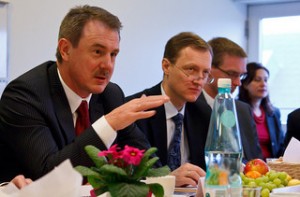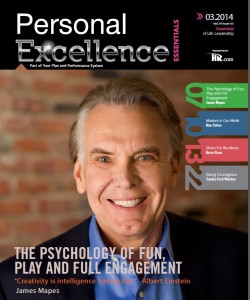Mamata making soap
My wife Suzanne and I recently spent a week with a group of Hunger Project investors attending celebration ceremonies for 3 epicenters that have achieved the exciting accomplishment of being declared "self-reliant," meaning communities that have demonstrated the confidence, capacity and skills to act as agents of their own development based on 53 distinct, rigorous measures. All told, nearly 42,000 people living in the 47 communities that make up the 3 epicenters have graduated to self-reliance in Ghana. Between 40-90% of the community members participate in one or more of the programs during the Epicenter Strategy journey which empowers community partners to go from a state of despair and resignation to self-reliance in on average, about 8 years.
During these celebrations, Mamata, a young village mother of 4 children who participates in The Hunger Project's Atuobikrom Epicenter in Ghana, Africa stated one of the most impactful leadership insights I've heard in a very long time.
When we arrived at her home, she was busy making soap outside in the yard. She never slowed her work down as we gathered around her and asked her questions about her life. She shared her very heartfelt thoughts with us as we probed for details about her family, the economics of her business, and how it all relates, (or doesn't), to the work of The Hunger Project.
Intervention
She shared a number of fascinating insights and her response to the last question was the capstone! "From your own experience as part of the epicenter, what would you like the women of the world to know?" Without hesitation, she replied, "be interested in intervention." Based on her earlier comments, she clearly was not talking about intervening in other people's lives. She meant intervention in your own life.
An example of what she was talking about was her “before and after” participation in The Hunger Project questions about her vision. She said she had no vision before being part of the program. Now she is building her soap-making business and has become involved in farming with her husband. She will put all her kids through school instead of having them work in the home and farm and she knows the importance of the kids getting an education. With support, she intervened in her own life and now her future has a completely different trajectory.
Her intervention quote was particularly relevant to me as I had just recently had a conversation with a rising star woman leader who shared her frustration with what seems to her an obsession with training in her organization and all the consultants pushing training, none of which seemed to her to be making much difference. We had contrasted the desire for information and intellectual understanding with development, which requires rigorous and sometimes painful examination of your own self-image and world view, and, more often than not, having to give up precious notions from your past. The payoff is that it will provide you with new openings and unexpected opportunities.
Mamata experienced The Hunger Project’s Vision, Commitment, and Action Program, along with several thousand of her neighbor's in the 11 villages that make up the epicenter. She has used that work to re-invent her life and create new possibilities for herself, her family, and the community.
If you became interested in intervention in your own life, what would be possible? What could it mean? What might be the unexpected outcomes? What if you could do it at the “collective level” of your organization as Mamata experienced within her Epicenter?




 As I write this, we are sailing a 28 mile crossing In the British Virgin Islands on a beautiful day with a steady wind and modest seas in a boat appropriately named "Escape Yourself." The length of the crossing and the steadiness of the sea conditions give me pause to consider the name of the boat assigned to us.
At first I notice the immediate ways to read/hear the name:
As I write this, we are sailing a 28 mile crossing In the British Virgin Islands on a beautiful day with a steady wind and modest seas in a boat appropriately named "Escape Yourself." The length of the crossing and the steadiness of the sea conditions give me pause to consider the name of the boat assigned to us.
At first I notice the immediate ways to read/hear the name: It
It Results-oriented leaders, particularly in our culture, are often driven by their own needs and wants. However, real power comes from providing the leadership that results from shared vision and shared focus.
A case in point, one of our clients was recently promoted to CEO. She has been asking how she can get her colleagues to want to work for her so she can lead the company to achieving its exciting vision. Suzanne, one of 2130’s co-founders, pointed out that the answer to her question is very unlikely to give her much access to the outcomes she is seeking. A much higher leverage conversation deals with focusing on enrolling everyone in focusing on the shared vision and unleashing their own creativity and self-generated accountability to fulfill the shared vision together.
Results-oriented leaders, particularly in our culture, are often driven by their own needs and wants. However, real power comes from providing the leadership that results from shared vision and shared focus.
A case in point, one of our clients was recently promoted to CEO. She has been asking how she can get her colleagues to want to work for her so she can lead the company to achieving its exciting vision. Suzanne, one of 2130’s co-founders, pointed out that the answer to her question is very unlikely to give her much access to the outcomes she is seeking. A much higher leverage conversation deals with focusing on enrolling everyone in focusing on the shared vision and unleashing their own creativity and self-generated accountability to fulfill the shared vision together. Have you ever noticed that your mind is chock full of running monologues that are instant, automatic, and largely unexamined? These “thoughts”arise from what we refer to as your “Mental File Cabinet” and require no effort on your part to occur. They are patterns of thinking that started forming when you were very young and now run on auto-pilot.
The problem is, if you haven’t learned to self-observe, these thoughts will function as very unintended biases to both your listening and your speaking. These biases will very likely give you the outcomes that currently frustrate you, or even create upsets in others.
Have you ever noticed that your mind is chock full of running monologues that are instant, automatic, and largely unexamined? These “thoughts”arise from what we refer to as your “Mental File Cabinet” and require no effort on your part to occur. They are patterns of thinking that started forming when you were very young and now run on auto-pilot.
The problem is, if you haven’t learned to self-observe, these thoughts will function as very unintended biases to both your listening and your speaking. These biases will very likely give you the outcomes that currently frustrate you, or even create upsets in others. One of the most common challenges I see among leaders is unwillingness to have difficult conversations. It is a very common issue for leaders to be unable to be direct with others about failures to perform and their roles in problems. I seldom see swift, effective feedback that communicates disappointment with another person's behavior. The trouble is, none of us grow without pain.
The thing is, people are far more resilient than it seems. In fact, people aspiring to leadership will actively seek direct feedback, even if it hurts. I don't have specific data about exactly what stops leaders from being direct, but after working with them for so many years my observation is that the issue is more about fear of being rejected, abandoned, or simply not knowing how to proceed that stops leaders from being as direct as they could be.
One of the most common challenges I see among leaders is unwillingness to have difficult conversations. It is a very common issue for leaders to be unable to be direct with others about failures to perform and their roles in problems. I seldom see swift, effective feedback that communicates disappointment with another person's behavior. The trouble is, none of us grow without pain.
The thing is, people are far more resilient than it seems. In fact, people aspiring to leadership will actively seek direct feedback, even if it hurts. I don't have specific data about exactly what stops leaders from being direct, but after working with them for so many years my observation is that the issue is more about fear of being rejected, abandoned, or simply not knowing how to proceed that stops leaders from being as direct as they could be. John Dewey said that “a problem well-stated is a problem half-solved.” My correlate to that is "a problem mis-named is a problem stuck!"
John Dewey said that “a problem well-stated is a problem half-solved.” My correlate to that is "a problem mis-named is a problem stuck!" As discussed in my recent blog series, all you really have to effect your leadership is your thinking, listening and speaking. An essential ingredient of growing yourself and your leadership is gaining self-awareness and the ability to self-observe and intervene while you are in the heat of the action. If you can’t self-observe, you can’t hear/see how you are thinking and communicating, and whether you are even connecting at all.If you can't self-observe, you will be unable to give yourself a new brain assignment that self-corrects your instant, automatic and largely unexamined reactions.
In our work, we invite clients to consider their brain as a “Mental File Cabinet”which stores every experience from every one of our five senses at every moment. The catch in that is that you have all sorts of filters, biases, and predispositions that severely limit what gets into your Mental File Cabinet. Further, your Mental File Cabinet has strange and unique filing procedures and cross-referencing.
As discussed in my recent blog series, all you really have to effect your leadership is your thinking, listening and speaking. An essential ingredient of growing yourself and your leadership is gaining self-awareness and the ability to self-observe and intervene while you are in the heat of the action. If you can’t self-observe, you can’t hear/see how you are thinking and communicating, and whether you are even connecting at all.If you can't self-observe, you will be unable to give yourself a new brain assignment that self-corrects your instant, automatic and largely unexamined reactions.
In our work, we invite clients to consider their brain as a “Mental File Cabinet”which stores every experience from every one of our five senses at every moment. The catch in that is that you have all sorts of filters, biases, and predispositions that severely limit what gets into your Mental File Cabinet. Further, your Mental File Cabinet has strange and unique filing procedures and cross-referencing. It seems to me that the bulk of what passes for leadership development currently is actually training to improve your ability to be someone else. By that I mean training to fit yourself into what the world seems to want. The issue isn’t confined to just leadership training. Reading resumes has become almost worthless because counselors have taught most people to write them in a way that claims credit for all sorts of spectacular results and uses lots of key words that show up in headhunter searches.
Author, speaker and workshop leader David Whyte offers the following perspective: “…human beings have never had the luxury of choosing between an untouched and interior foundational self and the necessities and often overwhelming revelations of the outer world.”
It seems to me that the bulk of what passes for leadership development currently is actually training to improve your ability to be someone else. By that I mean training to fit yourself into what the world seems to want. The issue isn’t confined to just leadership training. Reading resumes has become almost worthless because counselors have taught most people to write them in a way that claims credit for all sorts of spectacular results and uses lots of key words that show up in headhunter searches.
Author, speaker and workshop leader David Whyte offers the following perspective: “…human beings have never had the luxury of choosing between an untouched and interior foundational self and the necessities and often overwhelming revelations of the outer world.” David Whyte asks the beautiful question, “what if that story I have been telling myself is not true anymore?”Complementary to that question, I often reflect on what’s available in my life as a result of having given up old stories, most of which had me as a victim at the center at the time I told the story the first time.
My wife Suzanne and I recently had the extraordinary opportunity to experience a marvelous “payoff”from having given up our various stories about the people we were previously married to, the events around the end of those marriages, and the other people who were involved in various ways at the time.
David Whyte asks the beautiful question, “what if that story I have been telling myself is not true anymore?”Complementary to that question, I often reflect on what’s available in my life as a result of having given up old stories, most of which had me as a victim at the center at the time I told the story the first time.
My wife Suzanne and I recently had the extraordinary opportunity to experience a marvelous “payoff”from having given up our various stories about the people we were previously married to, the events around the end of those marriages, and the other people who were involved in various ways at the time. Effective leadership requires intentional
Effective leadership requires intentional  Last week
Last week In developing your leadership effectiveness you really only have 3 areas to impact - your thinking, your listening and your speaking. Since your thoughts shape your speaking and listening, that is your key leverage point, so let’s start there.
Two recent events have reminded me of how completely our thoughts dominate and shape our experience and that, in turn, controls our leadership and relationship effectiveness. Before getting to the events let’s set some context. When delving into the arena of thoughts we like to talk about it by saying that each of us has what amounts to a Mental File Cabinet. Several characteristics of the ‘Mental File Cabinet” are:
In developing your leadership effectiveness you really only have 3 areas to impact - your thinking, your listening and your speaking. Since your thoughts shape your speaking and listening, that is your key leverage point, so let’s start there.
Two recent events have reminded me of how completely our thoughts dominate and shape our experience and that, in turn, controls our leadership and relationship effectiveness. Before getting to the events let’s set some context. When delving into the arena of thoughts we like to talk about it by saying that each of us has what amounts to a Mental File Cabinet. Several characteristics of the ‘Mental File Cabinet” are:
 Leadership and the qualities of good leaders are often debated and there is no single definition on which everyone seems to agree. Let’s narrow the focus to the role of the CEO.
We really like our colleague
Leadership and the qualities of good leaders are often debated and there is no single definition on which everyone seems to agree. Let’s narrow the focus to the role of the CEO.
We really like our colleague  Traditionally, high value has been placed on splitting or compartmentalizing “personal life” and work. There has been pressure in the workplace to behave rationally, productively and with focus – day in and day out. The message has been to shut out personal circumstances, emotions, and life experiences and be task and accomplishment oriented. For leaders, the expectation has been to be driven and a driving force for others, relentlessly pushing the business and the team forward.
Within this framework there has been no room for emotions, emotional energy, and in some ways real humanity. This has been part of the gender divide in the work place – for many years women were considered too emotional to be leaders.
Traditionally, high value has been placed on splitting or compartmentalizing “personal life” and work. There has been pressure in the workplace to behave rationally, productively and with focus – day in and day out. The message has been to shut out personal circumstances, emotions, and life experiences and be task and accomplishment oriented. For leaders, the expectation has been to be driven and a driving force for others, relentlessly pushing the business and the team forward.
Within this framework there has been no room for emotions, emotional energy, and in some ways real humanity. This has been part of the gender divide in the work place – for many years women were considered too emotional to be leaders. Well of course it IS about football - competition, pride, and all that goes with it. That's the simple explanation, but it’s also about a phenomenon – within the sport and the local community.
Well of course it IS about football - competition, pride, and all that goes with it. That's the simple explanation, but it’s also about a phenomenon – within the sport and the local community.
 Avoiding life’s essentially chaotic and messy nature seems to be a preoccupation of many leaders. The question is - why? Underneath it all the truth about this is something that none of us really wants to face or admit. The reality is if you are willing to be present to the messiness and take appropriate action based on the conditions in which you actually find yourself, you will be uncomfortable quite often and also probably experience feeling vulnerable.
I was recently reminded of this subject while watching a TED video by Glennon Doyle Melton entitled “
Avoiding life’s essentially chaotic and messy nature seems to be a preoccupation of many leaders. The question is - why? Underneath it all the truth about this is something that none of us really wants to face or admit. The reality is if you are willing to be present to the messiness and take appropriate action based on the conditions in which you actually find yourself, you will be uncomfortable quite often and also probably experience feeling vulnerable.
I was recently reminded of this subject while watching a TED video by Glennon Doyle Melton entitled “